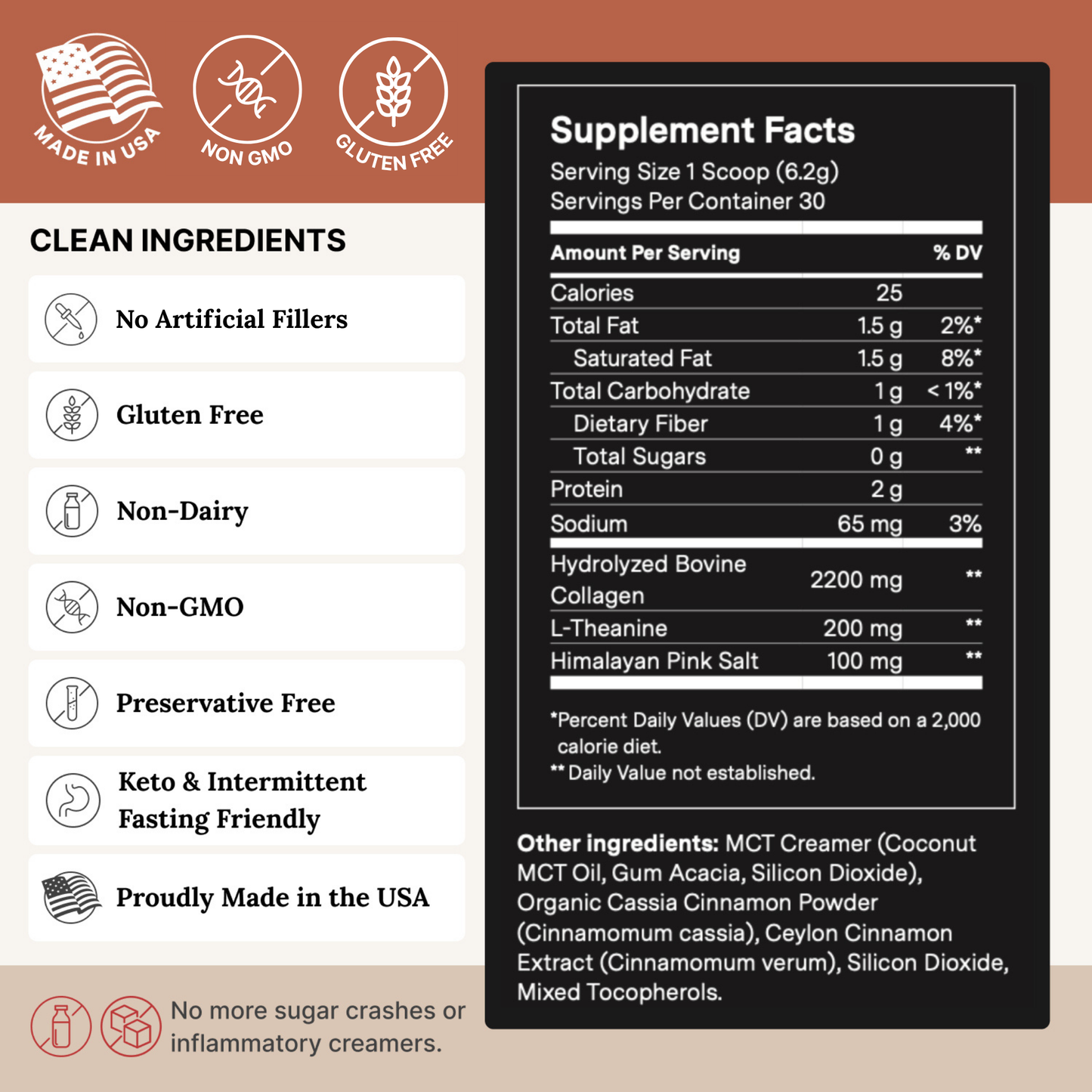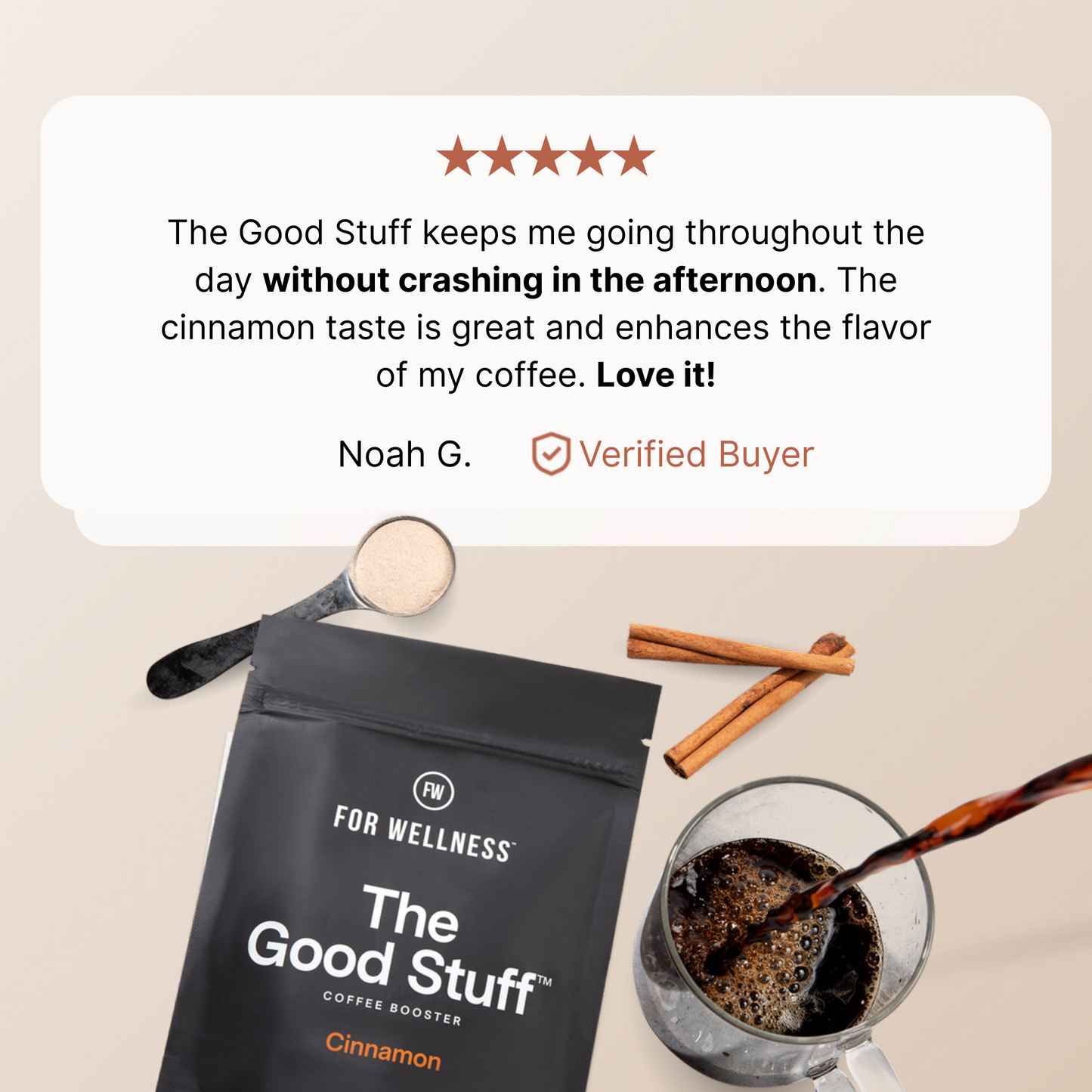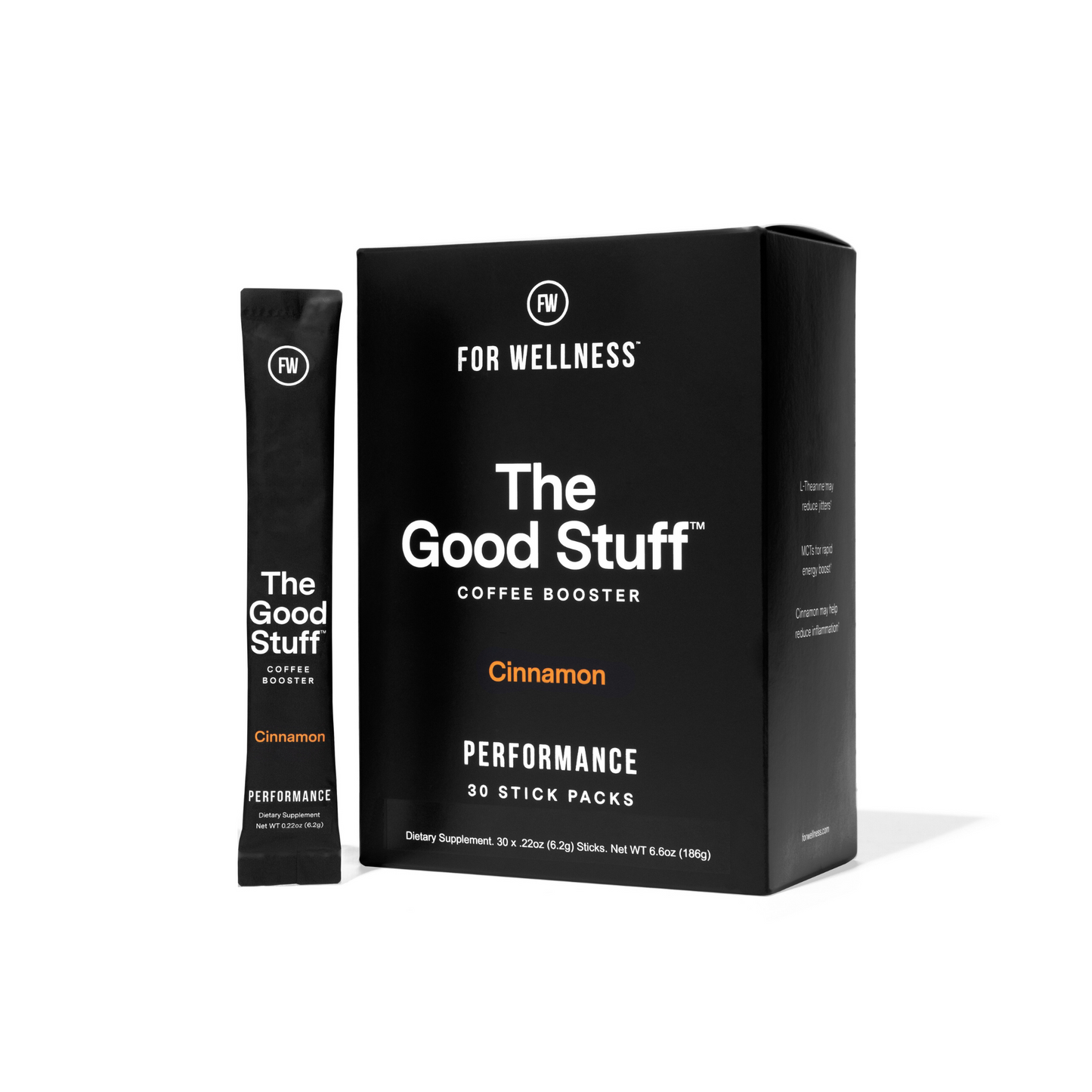When autumn arrives, our kitchens transform into havens of warming spices and comforting flavors. But the foods and spices we crave during fall aren't just delicious—they're packed with remarkable health benefits that have been used in traditional medicine for centuries and are now validated by modern science.
Let's explore the powerful health properties hiding in your favorite fall flavors, so you can feel even more excited about getting into the spirit.
Cinnamon: The Ancient Healer in Your Spice Rack
Few spices capture the essence of fall quite like cinnamon. That warm, sweet aroma that fills your kitchen when baking isn't just comforting—it's a signal of one of nature's most potent medicinal spices.
That's why we added cinnamon to The Good Stuff—not only is it utterly delicious, it's packed with long-term health benefits!


The Good Stuff - Performance
-
One scoop will infuse your coffee with healthy ingredients
-
Ditch the bad stuff like sugar, dairy, and artificial creamers
-
Fights inflammation and supports skin and joint health
-
Makes your coffee taste great
Blood Sugar Regulation
One of cinnamon's most researched benefits is its ability to help regulate blood sugar levels. Cinnamon contains compounds that mimic insulin and increase glucose uptake by cells. Studies suggest that consuming just half a teaspoon to two teaspoons of cinnamon daily may lower blood sugar levels in people with type 2 diabetes. It slows the breakdown of carbohydrates in the digestive tract and improves insulin sensitivity, making it a valuable tool for metabolic health.
Anti-Inflammatory Powerhouse
Cinnamon is loaded with antioxidants, including polyphenols, which help fight inflammation throughout the body. Chronic inflammation is linked to nearly every major disease, from heart disease to cancer to Alzheimer's. The antioxidants in cinnamon can help reduce this inflammation, potentially lowering your risk of chronic disease.
Brain Health Benefits
Research suggests that compounds in cinnamon may help protect against neurodegenerative diseases. Cinnamon contains cinnamaldehyde and epicatechin, which appear to inhibit the buildup of tau protein in the brain—a hallmark of Alzheimer's disease. While more research is needed, early studies are promising.
Heart Health Support
Cinnamon has been shown to reduce several risk factors for heart disease. It can lower total cholesterol, LDL (bad) cholesterol, and triglycerides while keeping HDL (good) cholesterol stable. It may also help reduce blood pressure, making it a heart-healthy addition to your daily routine.
Cocoa: The Superfood Hiding in Your Chocolate
There's nothing like a hot cocoa as the weather cools, but did you know that the cacao, from which cocoa is derived, is one of the most nutrient-dense foods on the planet?
Antioxidant Champion
Raw cacao is one of the highest sources of antioxidants in the world—even more than blueberries, green tea, or red wine. These antioxidants, particularly flavonoids, help neutralize free radicals and protect your cells from oxidative damage. The specific type of flavonoids in cacao, called flavanols, have been extensively studied for their health benefits.
Mood and Mental Health
There's a reason chocolate makes us feel good. Cacao contains several compounds that support mental health and mood. It has phenylethylamine (PEA), often called the "love molecule," which triggers the release of endorphins. Additionally, cacao contains magnesium, which helps regulate neurotransmitters and can reduce symptoms of depression and anxiety.
Cardiovascular Benefits
The flavanols in cacao improve blood flow by stimulating the production of nitric oxide, which relaxes and dilates blood vessels. This can lower blood pressure and reduce the risk of heart attack and stroke. Regular consumption of dark chocolate (70% cacao or higher) has been associated with a reduced risk of cardiovascular disease.
Cognitive Function
Studies show that cacao flavanols can improve cognitive function, particularly in older adults. They enhance blood flow to the brain, which can improve memory, attention, and processing speed. Some research even suggests that regular cacao consumption might help protect against age-related cognitive decline.
We use a cacao derivative called Chocamine® in The Good Stuff Focus for this very reason!
Mineral-Rich Nutrition
Cacao is an excellent source of magnesium, iron, potassium, and zinc. Magnesium is crucial for over 300 biochemical reactions in the body, iron supports oxygen transport, potassium regulates blood pressure, and zinc boosts immune function.
Coffee: Your Daily Health Ritual
Coffee isn't just a morning necessity—it's one of the most studied beverages in nutritional science, and the news is overwhelmingly positive for coffee lovers.
Rich in Antioxidants
For many people, coffee is the single largest source of antioxidants in their diet. It contains hundreds of bioactive compounds, including chlorogenic acid, which has powerful antioxidant properties. These antioxidants help fight inflammation and protect against cellular damage.
Brain Function and Neuroprotection
Caffeine blocks an inhibitory neurotransmitter called adenosine, which leads to increased firing of neurons and the release of dopamine and norepinephrine. This improves energy levels, mood, memory, reaction time, and general cognitive function. Long-term studies suggest that regular coffee consumption is associated with a significantly reduced risk of Parkinson's disease, Alzheimer's disease, and dementia.
Metabolic Benefits
Coffee boosts metabolic rate by 5-20%, helping the body burn fat more efficiently. It also improves physical performance by increasing adrenaline levels and breaking down body fat for use as fuel. Several studies show that coffee drinkers have a significantly lower risk of type 2 diabetes.
Liver Protection
Coffee appears to have remarkable protective effects on the liver. Regular coffee consumption is associated with a lower risk of cirrhosis, fatty liver disease, and liver cancer.
Longevity
Multiple large studies have found that coffee drinkers have a lower risk of premature death. The relationship appears to be dose-dependent up to about four cups per day, after which the benefits plateau. Coffee drinkers show reduced risk of death from stroke, heart disease, and several other conditions.
Pumpkin: The Nutritional All-Star of Fall
While pumpkin spice gets all the attention, the pumpkin itself deserves the spotlight. This humble gourd is a nutritional powerhouse that offers benefits far beyond pie filling.
Vision Protection
Pumpkin is extraordinarily rich in beta-carotene, which the body converts to vitamin A. One cup of cooked pumpkin provides over 200% of the recommended daily intake of vitamin A. This nutrient is essential for eye health and can help prevent age-related macular degeneration. Pumpkin also contains lutein and zeaxanthin, antioxidants that accumulate in the retina and protect against eye damage.
Recovery Gummies Focus also contain lutein, zeaxanthin, and vitamin A for regular brain and eye support.
Immune System Support
The high vitamin A content in pumpkin is crucial for immune function. It helps maintain the integrity of skin and mucous membranes, which are the body's first line of defense against pathogens. Pumpkin is also rich in vitamin C, which stimulates white blood cell production and helps immune cells function more effectively.
Heart Health
Pumpkin contains fiber, potassium, and vitamin C, all of which support heart health. The fiber helps lower cholesterol levels, potassium helps regulate blood pressure, and antioxidants protect against oxidative stress that can damage blood vessels.
Skin Health
The beta-carotene in pumpkin doesn't just support eye health—it also protects skin from sun damage. The vitamins C and E in pumpkin work together to promote collagen production and protect against free radical damage, helping maintain healthy, youthful-looking skin.
Ginger: The Warming Digestive Aid
As temperatures drop, we naturally reach for ginger—in tea, baked goods, and warming dishes. This knobby root has been used medicinally for thousands of years, and modern research confirms its therapeutic properties.
Digestive Relief
Ginger is perhaps best known for its ability to ease digestive discomfort. It accelerates gastric emptying, which can help reduce symptoms of indigestion and bloating. Ginger is also highly effective for nausea, whether from motion sickness, morning sickness during pregnancy, or chemotherapy.
Anti-Inflammatory Effects
Ginger contains gingerol, a bioactive compound with powerful anti-inflammatory and antioxidant properties. Regular consumption of ginger has been shown to reduce muscle pain and soreness, and may help manage symptoms of osteoarthritis by reducing inflammation in the joints.
Immune Boost
Ginger has natural antimicrobial properties that can help fight infections. It's particularly effective against respiratory viruses, making it a perfect addition to your fall routine as cold and flu season approaches.
Nutmeg: The Underrated Spice
Often overshadowed by cinnamon in fall recipes, nutmeg has its own impressive health credentials.
Sleep and Relaxation
Nutmeg has been used as a natural sleep aid for centuries. It contains compounds that have sedative effects and can help promote restful sleep. A small amount of nutmeg in warm milk before bed is a traditional remedy for insomnia.
Digestive Support
Like ginger, nutmeg supports digestive health. It can help relieve gas, bloating, and indigestion. Nutmeg also stimulates the secretion of digestive enzymes, improving overall digestive function.
Cloves: Tiny but Mighty
These dried flower buds pack an incredible nutritional punch relative to their size.
Antioxidant Density
Cloves have one of the highest antioxidant contents of any spice. They're particularly rich in eugenol, a compound with powerful antioxidant and anti-inflammatory properties. Just one teaspoon of ground cloves contains more antioxidants than half a cup of blueberries.
Blood Sugar Regulation
Similar to cinnamon, cloves may help regulate blood sugar levels by improving insulin function. Studies suggest that compounds in cloves can mimic insulin and help transport glucose into cells.
Bringing It All Together
The foods and spices we crave in fall aren't just comfort foods—they're medicine in delicious disguise. From cinnamon's blood sugar benefits to cacao's mood-boosting properties, from coffee's neuroprotection to pumpkin's immune support, these autumn favorites offer science-backed health benefits that can support your wellbeing throughout the season and beyond.
The key is to incorporate these foods regularly and in their most beneficial forms: Ceylon cinnamon rather than cassia, raw or minimally processed cacao, quality coffee, whole pumpkin rather than sugary pie filling, and fresh spices rather than years-old jars from the back of your cabinet.
This fall, embrace these flavors not just for their taste, but for the powerful health benefits they bring to your table. Your body—and your taste buds—will thank you.















